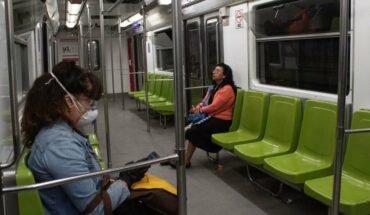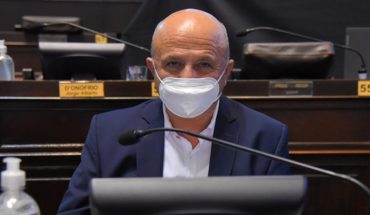In the midst of the official tension, due to the decision of the PPD and the Radical Party (PR) to attend the election of constitutional councilors with two lists, eventually allying with the DC, some voices of Democratic Socialism questioned this logic of division of government alliances, all this in the face of speculation about the decision to be taken by the PS and the Liberal Party (PL). and the failed attempt of Apruebo Dignidad to promote a unitary list for the elections of next May 7.
In this regard, one of the deputies of Democratic Socialism who a few days ago signed a letter, along with several other pro-government parliamentarians, raising the urgency of both government coalitions competing in a single list, Deputy Juan Santana (PS), is clear in judging the intention of those who, in his sector, bet on separate lists. “There are those who, like former Senator Girardi, have been in charge during these last weeks of creating a friendly fire between the ruling parties, seeking to create real minefields so that the government coalitions finally end up atomizing,” Santana said.
For the socialist deputy “there would be no reason” why Democratic Socialism and I approve dignity should be separated “in an instance as important as this,” ensuring that as the electoral system of these elections is designed – similar to the binominal system – “obviously that fracture of the center-left will contribute to the triumph or the better electoral performance of the right.”
For his part, the parliamentarian, who is part of the Labor Commission of the Chamber of Deputies, referred to the scope of the pension reform that is currently being processed in Congress, whose idea of legislating would be voted on Wednesday, January 25. In addition, Santana valued the progress in the Senate of the project that reduces the working day from 45 to 40 hours per week, which, in his opinion, seeks to dignify the working conditions of workers.
What do you think about the decision of the parties of your coalition – Democratic Socialism – such as the PPD and the Radical Party (PR) to promote two lists for the election of constitutional councilors? Does this harm the unity of government alliances?
We are aware of the complex moment that the country is experiencing, and that demands from us precisely greater cohesion and greater unity to be able to carry out those reforms that are fundamental for the country, being the pension reform one of them and the agreement on security. I believe that it is mainly us, the government parties, who have to support it and contribute to expanding its support base, both at the security table and in economic matters. We believe that unity is indispensable in the political forces of government, in order to be able to materialize the commitments that were acquired in these matters, but it is also important in an aspect as fundamental as the elaboration of a new Constitution. There are those who, like former Senator Girardi, who have been in charge during these last weeks of creating a friendly fire between the government parties, seeking to create real minefields so that the government coalitions finally end up atomizing.
How to avoid this official atomization, to which you refer? Is it possible to push for unity, since voices continue to emerge that appeal to a rearticulation of the centrist sectors, reviving the extinct Concertación?
-We believe that there are more aspects and stories that unite us than those that distance us. We were together in 1988 to defeat Pinochet, we have been together in each of the reforms to be able to eliminate or modify the authoritarian enclaves that remained of the 1980 Constitution, we were together for the instance of the constitutional agreement of November 15 that enabled the first constituent process, and we have been together in the historical moments where our democracy has been in question in our country. There would be no reason why we should separate in such an important instance. The complex and divisive moments are those where political parties must have a greater degree of cohesion and a greater degree of loyalty to the Government.
What do you think of the idea that Democratic Socialism would try to influence a “change of discourse” of the Government, seeking new spaces of power? in La Moneda? Is the election of constitutional advisers a propitious moment to lay bare their internal differences?
In my opinion, there is a thesis that lacks any foundation and a completely wrong idea, which is that if the Government of President Boric does badly, only the parties of Apruebo Dignidad will be weakened, and I believe that those who think that within Democratic Socialism, do not understand the incalculable consequences that would have if the Government did badly. If President Boric’s government does badly, all the parties are doing badly and all the parties that are part of his alliance are weakened, including the Socialist Party, the PPD, the Humanist Party (PH) and the Radical Party (PR), because we are part of this project. I believe that the statements we have heard in recent weeks reveal a revanchist spirit that basically bets on two lists, an issue that has no justification whatsoever for an election like this, which is very similar to the election with the binomial system, where in most regions two or three councillors are elected. except the RM and the Valparaíso Region. In the rest of the regions, if we are separated, obviously this fracture of the center-left will contribute to the triumph or better electoral performance of the right.
On another matter, what is the degree of progress of the pension reform? How has your discussion been in the Labor Committee of the Chamber and how willing are you, as the ruling party, to introduce changes to the bill that is currently being processed in Congress?
The vote that would be next week is the general vote on the project, the idea of legislating. After that, we should start voting article by article. The truth is that I am available, together with the PS bench, to be able to introduce observations or modifications that contribute and that go in the central line of what this pension reform is (…) But I believe that the reform is an initiative that already brings with it aspects that were highly promoted by the opposition. In fact, if one reviews, for example, with regard to the individual savings of each worker, this reform will give people the possibility – an issue that does not exist today – to people to be able to choose which agency, whether a public or a private one, is going to be the one who manages their individual savings. And there, of course, we made progress on something that was pointed out a lot in the constitutional debate, which had to do with the freedom of choice of each person.
And, on the other hand, absolute certainties have been given that the individual savings of each worker will remain the property of each worker, but that it will also be able to be inherited. That is, this reform mixes aspects that were promoted by the right in our country, in recent situations, but on the other hand, introduces elements that for our world of the center-left, are fundamental to be able to improve pensions. And one of them, of course, is solidarity, understanding that in order to improve the pensions of current retirees, those who will not have the possibility of contributing anymore, it is necessary that there is intergenerational solidarity, as the minister has called it, and for that of course the creation of social security, With this 6% additional savings, it is essential.
Finally, and in relation to the bill that reduces the workday from 45 to 40 hours per week, which is advancing in the Senate, what do you think about how the project is going?
We are happy that the Senate has finally made progress on this initiative, and this is expressed in the modification of Article 22, which will allow us to go from 45 to 40 hours, and other advances that have been introduced in the Upper House, such as the fact that electronic control has been formalized in the attendance of each worker. the fact that overtime can be compensated with up to five new holidays, allowing the possibility of working in this 4 x 3 system, especially in the mining sector, and a series of aspects, such as exceptional days, understanding that a regulation will be created for that. We believe that all these aspects will contribute to this decision of the Government and Congress to reduce the working day being a good decision, and that it goes in line with dignifying the working conditions of workers.
Follow us on





